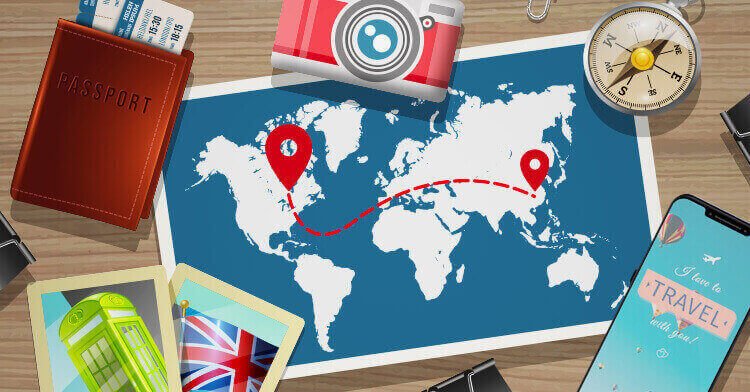As a seasoned traveler, you’re probably aware of the countless travel guides available. But, what sets Lonely Planet apart? In this article, we’ll delve into the world of Lonely Planet, exploring its exceptional features, and why it’s the go-to resource for travelers worldwide.
Lonely Planet is the ultimate travel companion, offering expert advice, inspiring stories, and practical tips to make your travels unforgettable.
Get ready to unleash your inner wanderer and discover the magic of Lonely Planet!
What Is Lonely Planet? – You Should Know!
Lonely Planet is a renowned travel guidebook publisher that has been inspiring travelers for over 50 years. Founded in 1972 by Tony and Maureen Wheeler, the company has evolved into a comprehensive travel resource, offering guidebooks, e-books, digital media, and a website.
Lonely Planet provides expert advice, inspiring stories, and practical tips to make travels unforgettable. Written by experienced travelers and local experts, the guides cover over 500 destinations worldwide, offering in-depth knowledge, detailed maps, and insider tips.
With its trusted and authoritative content, Lonely Planet has become the go-to resource for travelers seeking authentic and enriching experiences.
The Evolution Of Travel Guides – From Paperbacks To Digital Giants!

The Era of Printed Paperbacks:
In the early days of travel, printed paperbacks emerged as the primary source of guidance for adventurers exploring new destinations.
Travel experts meticulously curated these compact books, offering valuable insights into destinations’ culture, history, and attractions.
Companies like Baedeker and Michelin became household names, their guides serving as trusted companions for generations of travelers.
Transition to Digital Platforms:
The advent of the internet brought about a seismic shift in the travel industry, paving the way for digital platforms to revolutionize how we access information.
Recognizing the growing demand for digital solutions, traditional guidebook publishers embraced technology, digitizing their content and making it accessible online.
This transition began a new era for travel guides, characterized by convenience, interactivity, and real-time updates.
Rise of Digital Giants:
As digital platforms gained prominence, a new breed of travel companies emerged as dominant players in the industry.
Giants like Lonely Planet, TripAdvisor, and Google Maps leveraged their vast resources and innovative technologies to create comprehensive, user-friendly travel guides.
These platforms offered a wealth of information at travelers’ fingertips, from detailed itineraries and reviews to interactive maps and augmented reality experiences.
Advantages of Digital Guides:

The rise of digital travel guides brought with it a host of advantages for travelers. Unlike their printed counterparts, digital guides are dynamic and constantly updated, ensuring that users have access to the latest information and recommendations.
Additionally, the interactive nature of digital platforms allows for greater customization, enabling travelers to tailor their experiences based on personal preferences and interests.
Challenges of the Digital Age:
While digital travel guides offer undeniable benefits, they also pose unique challenges for both travelers and industry professionals.
The abundance of online content can be overwhelming, making it difficult for users to navigate through the sea of information and discern reliable sources.
Moreover, the democratization of content creation has led to an influx of user-generated reviews and recommendations, raising concerns about authenticity and credibility.
Read: Borneo Travel Guide – Your Ultimate Travel Guide In 2024!
Big Names Dominating The Travel Guide Realm – The Powerhouses!
Lonely Planet: Pioneering Travel Insights:
Lonely Planet, a well-known name in travel, started in 1973 when Tony and Maureen Wheeler founded the company. Their first book, “Across Asia on the Cheap,” began a journey that changed the way travel books are made.
Lonely Planet’s writers go to places themselves to get the best information. They share practical tips and insights into different cultures.
The company works with many experts from around the world to make its guidebooks. It keeps updating its content to reflect new travel trends and destinations, making it a trusted friend for travelers everywhere.
Fodor’s: Expert Recommendations and User Engagement:
Established in 1936 by Eugene Fodor, Fodor’s has long been synonymous with expert travel recommendations. The publication’s inaugural guidebook, “On the Continent,” set a precedent for comprehensive coverage and practical advice.
Acquired by Random House in 1986, Fodor expanded its reach while maintaining its commitment to quality. Fodor’s approach to content creation combines professional insights with user-generated content and reviews, offering travelers a well-rounded perspective.
A team of seasoned travel writers and editors ensures accuracy and reliability in recommendations, catering to a diverse audience of travelers seeking memorable experiences.
Rick Steves’: Budget-Friendly Cultural Exploration:

Rick Steves’ name has become synonymous with budget-friendly travel and cultural exploration since he founded his company in 1976.
Initially focusing on European destinations, Rick Steves’ guidebooks offer detailed maps, insightful commentary, and practical tips for travelers. Steves’ approach to content creation reflects his passion for off-the-beaten-path exploration and cultural immersion.
His guidebooks not only highlight popular attractions but also encourage travelers to engage with local communities and embrace authentic experiences.
Emphasizing sustainability and responsible tourism, Rick Steves advocates for mindful travel practices, supporting local businesses and initiatives worldwide.
The Influence Of Big Names On Travel Culture And Trends – Check It!
Shaping Perceptions and Decisions:
- Big names in travel guides have a significant impact on how travelers perceive destinations and plan their trips.
- Through their extensive coverage and expert recommendations, these companies shape travelers’ expectations and influence their decision-making process.
- Travelers often rely on trusted sources like Lonely Planet, Fodor’s, and Rick Steves’ for insights into destinations’ cultural significance, must-see attractions, and off-the-beaten-path experiences.
Role of User-Generated Content and Community Engagement:
- In the digital age, user-generated content plays a crucial role in modern travel guides.
- Travelers contribute their own experiences, reviews, and recommendations, enriching the content with diverse perspectives and firsthand insights.
- Community engagement fosters a sense of belonging and camaraderie among travelers, creating a supportive network where individuals can share tips, advice, and travel stories.
- Big names in travel guides leverage user-generated content to supplement their professional insights, providing a comprehensive and up-to-date resource for travelers.
Impact of Endorsements and Recommendations:

- Endorsements and recommendations from big names in travel guides carry significant weight in the travel industry.
- Travelers trust these sources to steer them towards authentic and memorable experiences, leading to increased visitation to recommended destinations and attractions.
- Positive endorsements can boost tourism revenue and drive economic growth in destinations, while negative reviews can deter travelers and impact local businesses.
- Collaborations and partnerships between travel guide companies and tourism boards further amplify the influence of endorsements, shaping travel trends and promoting sustainable tourism practices.
Read: Black Travel Guide Magazine – Exploring The World!
Frequently Asked Questions:
1. What makes a travel guide a “big name” in the industry?
Big names in travel guides are typically well-established companies with a long history of providing reliable and comprehensive information to travelers. They often have a global reach, a diverse range of offerings, and a strong reputation for quality and trustworthiness.
2. How do travel guide companies ensure the accuracy of their information?
Travel guide companies employ teams of experienced writers, editors, and researchers who conduct thorough research and fact-checking to ensure the accuracy of their content. They also frequently update their guides to reflect changes in destinations and travel trends.
3. How can travelers contribute to travel guides?
Many travel guide companies accept user-generated content, such as reviews, recommendations, and travel tips, from travelers. This user-generated content can provide valuable insights and perspectives for other travelers planning their trips.
4. What role does community engagement play in modern travel guides?
Community engagement is crucial for modern travel guides as it fosters a sense of belonging and camaraderie among travelers. Travel guide companies often encourage community participation through forums, social media platforms, and interactive features on their websites.
5. How do travel guide companies adapt to changing consumer preferences?
Travel guide companies adapt to changing consumer preferences by diversifying their offerings, embracing technology, and focusing on personalized experiences. They also pay close attention to feedback from travelers and adjust their content and services accordingly.
6. What are some emerging trends in the travel guide industry?
Some emerging trends in the travel guide industry include the use of augmented reality, virtual reality, and artificial intelligence to enhance the user experience. Personalized recommendations, sustainable travel practices, and immersive storytelling are also gaining traction.
7. How do endorsements from travel guide companies impact tourism?
Endorsements from trusted travel guide companies can significantly impact tourism by influencing travelers’ decisions and perceptions of destinations. Positive endorsements can drive visitation and boost tourism revenue, while negative endorsements can deter travelers and impact local economies.
8. Are digital travel guides replacing traditional printed guidebooks?
While digital travel guides are becoming increasingly popular, traditional printed guidebooks still have a place in the industry. Many travelers prefer the tangible experience of flipping through a physical guidebook, while others appreciate the convenience and accessibility of digital platforms.
9. What measures do travel guide companies take to promote responsible tourism?
Travel guide companies promote responsible tourism by advocating for sustainable practices, supporting local communities, and highlighting ethical considerations for travelers. They often include information on conservation efforts, cultural preservation, and responsible travel tips in their guides.
10. How can travelers make the most of their experience with travel guides?
Travelers can make the most of their experience with travel guides by researching multiple sources, seeking out personalized recommendations, and actively engaging with the travel community. They should also be open to new experiences and embrace the unexpected adventures that travel brings.
Conclusion:
In the changing world of travel guides, the famous names still make a big difference in how we travel. Companies like Lonely Planet, Fodor’s, and Rick Steves’ started with books, but now they’re big online too. They’ve changed how we plan our trips.
Read:




